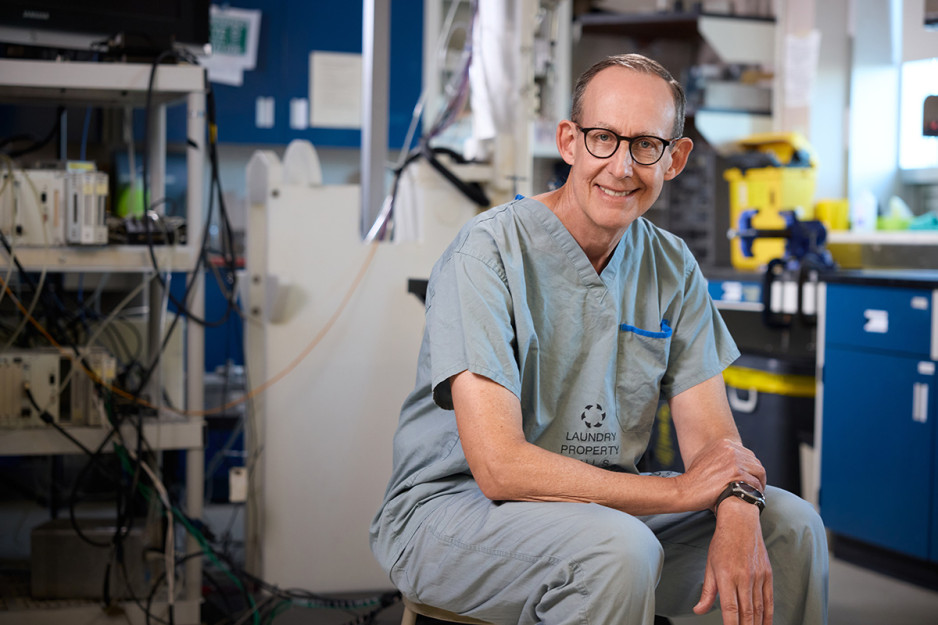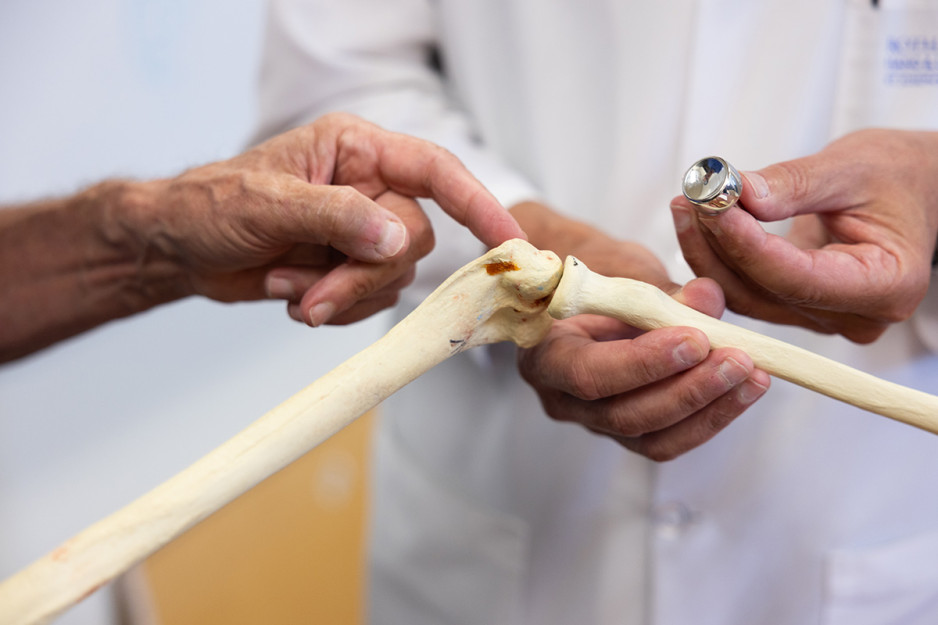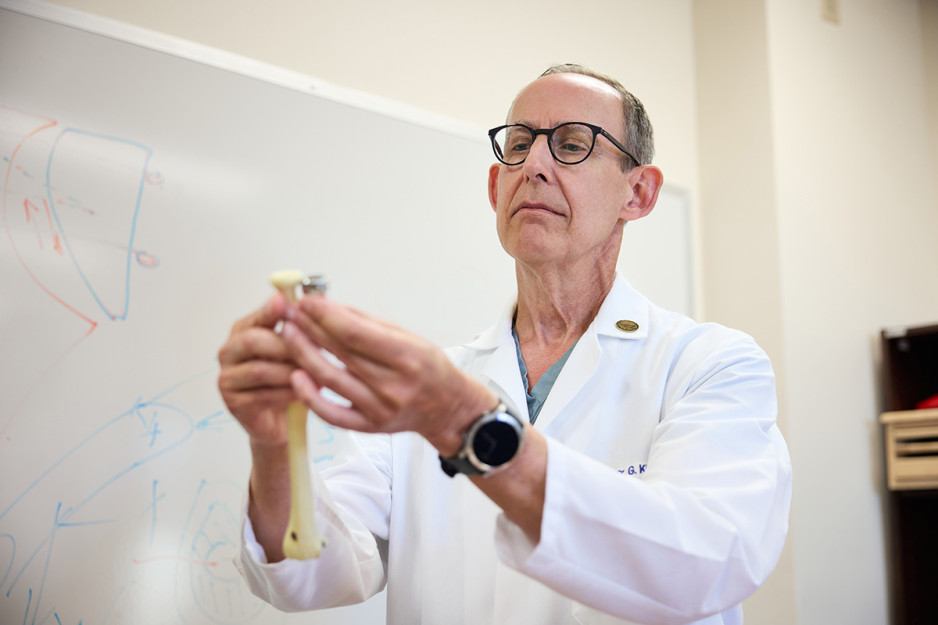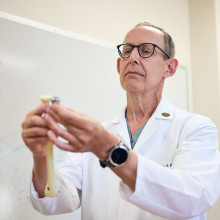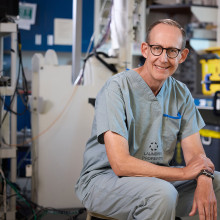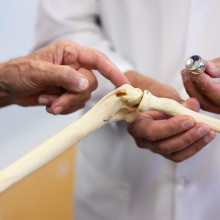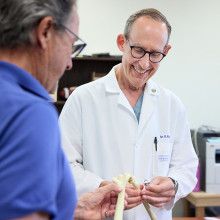A Lifetime of Impact
You likely wouldn’t know Dr. Graham King is one of Canada’s most accomplished orthopaedic surgeons unless you heard it first from a patient, colleague or international specialist.
Quietly modest, he isn’t apt to tell you the elbow implant he and his team developed is now one of the most widely used in the world.
So, it’s not surprising he’d also be among the last to tell you the Canadian Orthopaedic Association (COA) has made him a lifetime achievement award-winner for his considerable contributions to teaching, research and clinical care.
“I’m very proud of the honour, of course, but you don’t get an award like this alone. I would not have received this without my team,” he says.
King has succeeded in his role as a surgeon and researcher at St. Joseph’s Health Care London (St. Joseph’s) with a dedication to his profession and a quiet confidence. Since 1992, Dr. King has been working alongside his colleagues in the Roth | McFarlane Hand and Upper Limb Centre (HULC) to fill a historical gap in understanding elbow disorders and improving patient outcomes.
King’s work is an example of bench-to-bedside research. In the HULC bioengineering lab, he works alongside researcher Jim Johnson, PhD, and their team to ask relevant clinical questions and develop new solutions. Those solutions are then studied in patients in the clinical research lab alongside Joy MacDermid, PhD, the lab’s co-director, where King’s team can report on the outcomes and effectiveness of these surgical interventions.
These interventions, alongside improved physiotherapy practices and the creation of joint replacement implants, have been revolutionary in treating elbow disorders. Now, patients are reporting excellent outcomes for, on average, 17 years post-surgery.
The radial head replacement - an elbow replacement made of cobalt chrome created in the HULC bioengineering lab at Lawson Research Institute of St. Joseph’s - is one of the best-selling radial head implants in the world.
“It’s a good feeling, that all our efforts to develop new technologies for elbow problems have improved patient care. It’s a very rewarding part of my career, to see all of the advances we’ve made,” says King.
King has been an international resource for training and education throughout his career. He served on the executive board of the Canadian Orthopaedic Research Society, a subspeciality of COA, and was its president in 2002. King has also represented Canada as a travelling fellow, visiting health care organizations across North America, England and South Africa to teach surgeons and exchange knowledge. He has also routinely taught instructional courses at the COA for more than 30 years.
The COA Lifetime Achievement Award, presented in Calgary in June and followed by a local celebration soon afterwards, recognizes sustained and consistent contributions to the COA and the profession, the highest standard of patient care, and a significant impact nationally and internationally.
The themes of teamwork and leadership are central when talking with King. Despite the successes in his career, he is most proud of his trainees – the residents, fellows and researcher students who have worked with him. “I’m very proud of the mentorship I’ve been able to provide. I think you’re always most proud of your students. My ability to help others, help patients, is very fulfilling.”
For King, the future of upper limb surgery is promising. The current technology that is being used in lower-limb surgery will be making its way to the elbow soon, he says.
“The use of robotic devices to assist surgeons with implant placement and treatment, and the advances in AI and virtual reality will allow surgeons to leverage technology for improved surgical outcomes.”
King has advice for those looking to find success as surgeons.
“The most important thing is, if you have a passion, pursue that passion. I also encourage people to get more training while they’re young,” says King. For him, this translated to three additional years of training after his orthopaedic surgery residency, something that was uncommon in those years. “Additional training in research and clinical care will make you more likely to succeed in the long term and will provide other opportunities like teaching and research.”
In a career that has spanned more than 30 years, the number of patients King has helped is vast. Whether through direct patient care or indirectly through advancements in surgical techniques and implants, he has had a profound impact on those with upper limb concerns.
“Patient care is always number one,” says King. “Trying to provide patients with the best life possible in respect to the upper limb, that’s my job. The most rewarding part of my job is seeing patients being able to get back to work, to their hobbies, their sports – that's where I get the most satisfaction.”
